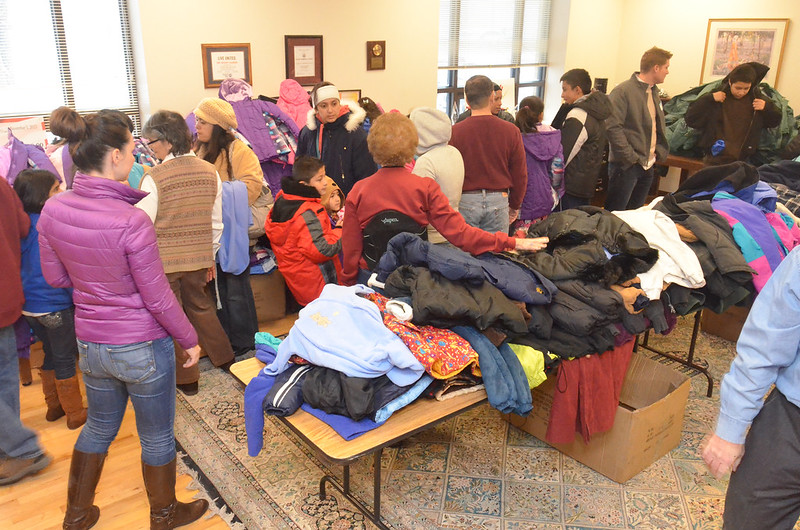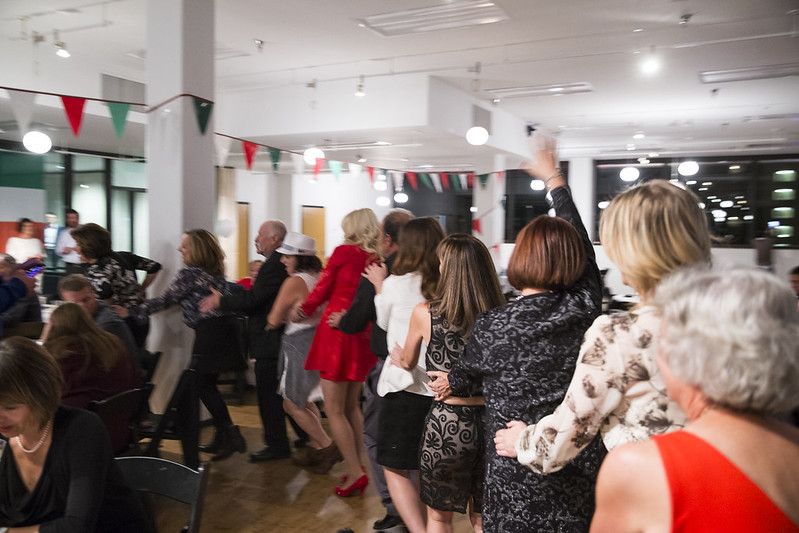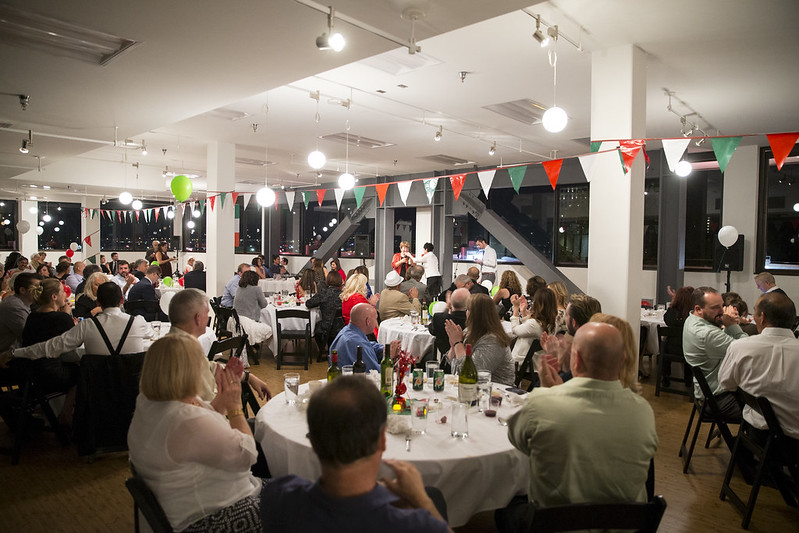
See also “An indigenous, LDS perspective on Columbus”
In fourteen hundred ninety-two, Columbus sailed the ocean blue.
This fact is considered indisputable by almost anyone with an elementary-level education. But what has been disputed publicly by various groups in recent years is the impact of his activities in the Western Hemisphere.
The credit Christopher Columbus received for discovering the Americas has long been up for debate. Many believe earlier explorers such as Leif Erikson landed on the American continent before Columbus’ arrival on islands just outside the Gulf of Mexico. What is acknowledged is that Columbus was the first to establish a back-and-forth connection between mainland Europe and the Americas. Along with this connection to Europe, Columbus brought with him European diseases, politics and enslavement of indigenous peoples.
Records of large-scale celebrations of Columbus’ discovery date back to the late 18th century. Columbus Day was made an official Utah state holiday in 1919 and an official federal holiday in 1934. Since 1971, Columbus Day has been officially observed on the second Monday of October.
But since its inception, and even more in recent years, debate has surrounded the holiday. Will Columbus Day survive its first hundred years as a designated federal holiday? Or will it be replaced with a holiday that celebrates Indigenous Americans, the people who already existed in the Americas long before his voyage? Can both holidays coexist?
Many cities and states have already made their decision that, no, the two cannot coexist. Indigenous Peoples Day replaces Columbus Day in Seattle, Wash.; Minneapolis, Minn.; Berkeley, Calif.; and parts of Alaska. Hawaii celebrates Discoverer’s Day in place of Columbus Day to celebrate the Polynesian explorers that discovered the Hawaiian Islands. South Dakota was the first to replace Columbus Day when it did so in 1990, replacing it with Native Americans Day.
Other states have said, “Why not both?” California celebrates Native American Day on the fourth Friday of September, and Tennessee celebrates American Indian Day on the fourth Monday of September.
The move to rename Columbus Day also seems to be growing. On Tuesday, Oct. 8, the governing council of the District of Columbia voted to replace Columbus Day with Indigenous Peoples Day. A survey released earlier this month by the college student polling platform College Pulse shows 69% of 1,500 college students surveyed support renaming Columbus Day to Indigenous Peoples Day.
Activist David Wright believes celebrating Columbus Day should be a thing of the past. He refers to the glorification of Columbus as “a big mistake from an educated perspective, a false claim and misguided ideal of domination.”
Wright believes replacing Columbus Day with Indigenous Peoples Day would give Native Americans greater rights to their heritage and history, and he said eliminating Columbus Day “is important to correct the imperialistic rule over governing humanity and the incorrect history.”
Simply put, Wright said he feels the need to reveal the truth about Columbus’ history with Indigenous Americans. He believes Columbus does not deserve to be remembered as a hero “because (Columbus) deserves no credit. He only opened the way for more exploration and the ideals of exploiting the wealth of our nation and cultures.”
Indigenous American and BYU professor Roni Jo Draper said the effects of Columbus on indigenous peoples extend far beyond the Taino peoples of Hispaniola, the island that is now Haiti and the Dominican Republic. While Columbus never directly interacted with indigenous Americans outside of Hispaniola and only briefly in Panama, he set a precedent for the treatment of indigenous peoples that lasts to this day, she said.
“He represents all the explorers who came after him,” Draper said. “Lewis and Clark, the pioneers, the Gold Rushers of 1849 … all of those folks who upon contact with indigenous people didn’t see humans; they saw savage individuals.”
Draper said she believes the way Columbus treated the Taino people affects indigenous people to this day.
“As soon as those folks could be identified as sort of subhuman, then it was much easier to say remove them, kill them, rape them, take their material goods, sell them as their own. And for a lot of indigenous peoples, we are still living that truth,” she said. “Those views of indigenous people haven’t shifted enough to allow indigenous peoples and their nations to thrive.”
She has seen the impact of this in her own life and personal heritage. Draper is a member of the Yurok Tribe, which lost approximately 72% of its population to the bounty put on Native American scalps in the 1850s following the Gold Rush in 1849. Her grandmother was forced into an Indian boarding school, and Draper’s father was taken from family and banished from his home at 16 years old by a non-indigenous judge.
“I don’t cast myself as a victim,” she said. “I cast us as survivors and people who are seeking to thrive through the harsh reality. But if we’re going to end racism, if we’re going to end white supremacy, we need people to start talking about it.”
For this reason, Draper said she and other indigenous people are done putting up with the traditional narrative surrounding Columbus.
Despite the pain surrounding Columbus Day that Draper and others feel, there are definite supporters; people who find joy in the legacy and celebration of the early explorer. These people were involved in the original lobbying efforts to designate Columbus Day as an official government holiday in their cities and states and even federally. Knights of Columbus, founded in 1882, is a Catholic fraternity that focuses on service and actively lobbies to preserve Columbus Day.

Each year the Knights of Columbus holds a Coats for Kids drive. (Andy Airriess) 
The Coats for Kids drive is one of many charitable contributions Knights of Columbus makes to the community. (Andy Airriess) 
A member of the Knights of Columbus helps a child try on a new coat at the Coats for Kids Drive. (Andy Airriess)
Andy Airriess, a Utah deputy with the Knights of Columbus, said Columbus was a natural choice to represent the group at its founding in 1882, as he was America’s most widely known and respected Catholic at the time. Catholics in that era were not popular among most Americans who often favored more Protestant religious beliefs. The Ku Klux Klan even targeted Catholics and fought against official designations for Columbus Day because of Columbus’ Catholicism.
Airriess said he believes much of Columbus’ legacy has been misconstrued by his political enemies. He said much of what Americans use to study Columbus was written by his chief political rival Francisco de Bobadilla. He likens taking Bobadilla for his word to taking former President Jimmy Carter for his word on his political foe, Ronald Reagan, who won the White House from Carter. While pointing out this potential historical bias, Airriess believes there are historical reports of Columbus’ misdeeds that can be trusted.
“Columbus was a great man. Was he perfect? No,” Airriess said.
Airriess said that Columbus’ intent with the Taino people was not primarily enslavement, but evangelization. He pointed out that slavery existed long before Columbus, and continues to exist, albeit in different ways, to this day.
Airriess said Columbus Day helps him celebrate his culture and heritage as a Catholic, and member of the Knights of Columbus, but he doesn’t think that means he has to oppose Indigenous Peoples Day. “I have nothing against adding an Indigenous Peoples Day,” he said. “But don’t take one away simply to get another. Start a new one.”
Columbus Day perhaps holds its greatest importance with Italian Americans who look to Columbus as the first Italian American. Though Columbus sailed under the Spanish flag, it is believed he was born in Genoa, Italy. Some Italian Americans view him as the first immigrant and use Columbus Day as an opportunity to celebrate their Italian American heritage.

Nick Fuoco, a board member with the Utah Italian American Civic League, said early Italian American immigrants relied on Columbus’ standing as a hero to help them assimilate into a hostile community. “Columbus was the first symbol of America that all Americans saw as a positive figure and that, in turn, mainstreamed us as Italian Americans to be seen as real Americans instead of being seen as the scum of America,” Fuoco said.

The Utah Italian American Civic League hosts an annual Festa Di Colombo. (Nick Fuoco) 
Italian Americans gather in 2015 for dinner, dancing, awards, and an opportunity to connect and celebrate their culture. (Nick Fuoco)
He said the way Italian immigrants were seen and treated mirrored the way many Latin immigrants have been treated in more recent years. He said Columbus can be a symbol to all immigrants and show the strength of the immigrant spirit.
Fuoco doesn’t try to dispute the controversial parts of Columbus’ history. “There were maybe some things that Columbus did that by modern standards would be barbaric or ridiculous, but that goes for every historical figure.”
Fuoco believes historical figures shouldn’t be judged by modern-day standards. “People did things that they’re not proud of. People make mistakes or things happen that are historically appropriate for their time but are not appropriate in the modern day,” Fuoco said. “To have this revisionist history and to try to understand something that happened 700 or 800 years ago is really a slippery slope.”
While Fuoco strongly supports the continuing celebration of Columbus Day, he believes it can coexist with an Indigenous Peoples Day, which he said is something the Utah Italian American Civic League would be happy to put its resources behind.
“This isn’t a zero-sum game,” Fuoco said. “We can continue to promote and celebrate our immigrant history and the history of Columbus at the same time while promoting indigenous people through their own day.”




